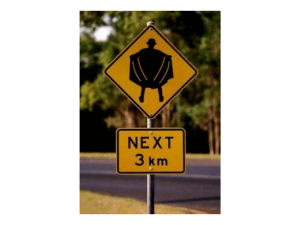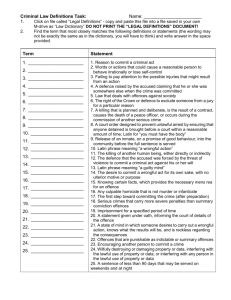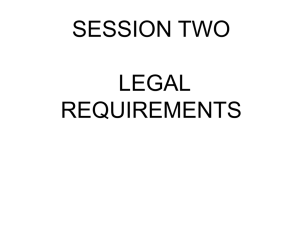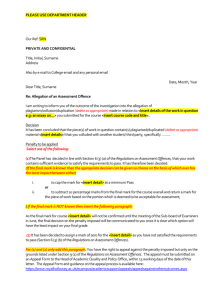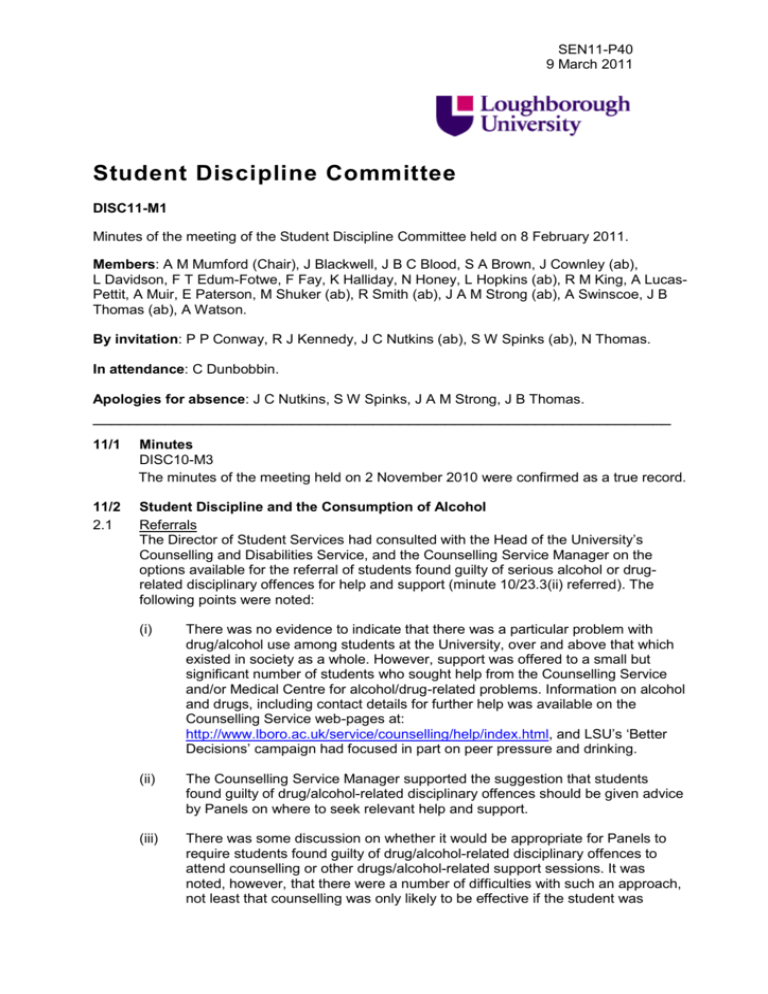
SEN11-P40
9 March 2011
Student Discipline Committee
DISC11-M1
Minutes of the meeting of the Student Discipline Committee held on 8 February 2011.
Members: A M Mumford (Chair), J Blackwell, J B C Blood, S A Brown, J Cownley (ab),
L Davidson, F T Edum-Fotwe, F Fay, K Halliday, N Honey, L Hopkins (ab), R M King, A LucasPettit, A Muir, E Paterson, M Shuker (ab), R Smith (ab), J A M Strong (ab), A Swinscoe, J B
Thomas (ab), A Watson.
By invitation: P P Conway, R J Kennedy, J C Nutkins (ab), S W Spinks (ab), N Thomas.
In attendance: C Dunbobbin.
Apologies for absence: J C Nutkins, S W Spinks, J A M Strong, J B Thomas.
________________________________________________________________
11/1
Minutes
DISC10-M3
The minutes of the meeting held on 2 November 2010 were confirmed as a true record.
11/2
2.1
Student Discipline and the Consumption of Alcohol
Referrals
The Director of Student Services had consulted with the Head of the University’s
Counselling and Disabilities Service, and the Counselling Service Manager on the
options available for the referral of students found guilty of serious alcohol or drugrelated disciplinary offences for help and support (minute 10/23.3(ii) referred). The
following points were noted:
(i)
There was no evidence to indicate that there was a particular problem with
drug/alcohol use among students at the University, over and above that which
existed in society as a whole. However, support was offered to a small but
significant number of students who sought help from the Counselling Service
and/or Medical Centre for alcohol/drug-related problems. Information on alcohol
and drugs, including contact details for further help was available on the
Counselling Service web-pages at:
http://www.lboro.ac.uk/service/counselling/help/index.html, and LSU’s ‘Better
Decisions’ campaign had focused in part on peer pressure and drinking.
(ii)
The Counselling Service Manager supported the suggestion that students
found guilty of drug/alcohol-related disciplinary offences should be given advice
by Panels on where to seek relevant help and support.
(iii)
There was some discussion on whether it would be appropriate for Panels to
require students found guilty of drug/alcohol-related disciplinary offences to
attend counselling or other drugs/alcohol-related support sessions. It was
noted, however, that there were a number of difficulties with such an approach,
not least that counselling was only likely to be effective if the student was
motivated to attend because they recognised that the process would be helpful
to them (rather than because they had been compelled to go). There was a
danger that the time of the counsellor, as well as the student, would be wasted
if this was not the case.
(iv)
It was difficult for Panels to establish the extent to which disciplinary offences
were drug/alcohol-related, and in particular whether a student’s intoxication on
the occasion of the offence in hand could be identified as being part of a
broader pattern of problematic behavior. This in turn made it difficult to
determine whether it was appropriate for Panels to recommend counselling
and/or other drugs/alcohol-related support in a particular case.
(v)
There was support for a suggestion that an interactive guide to issues relating
to drugs and alcohol, requiring students to log-in and answer a series of
questions, be created on LEARN. Panels could then recommend that students
look at this information, and students could demonstrate that they had done so.
It was noted, however, that resource would need to be made available to
progress this.
The Committee agreed that for all drugs/alcohol-related cases, the outcome letter to
the student would provide links to help and support available within the University and
elsewhere, and that Panel’s would be reminded that they could, if they considered it
appropriate, recommend to students that they seek help and support. The secretary
would liaise with the Director of Student Services to ensure that any information and
advice dispensed by Panels was current. ACTION: Secretary
2.2
2.3
Case Studies
It had been suggested at the previous meeting that anonymised case-studies,
containing details of penalties imposed by Student Disciplinary Panels for alcoholrelated offences, be published on the LSU website in order to support its ‘Better
Decisions’ campaign (minute 10/23.3(iii) referred), and the Chair had agreed to raise
this with the Chief Operating Officer (COO). The COO had noted, however, that the
publication of such case studies would be likely to compromise the anonymity of those
involved. There was also a danger that information on penalties imposed would lack
meaning without full case details. The COO’s view, therefore, was that case studies
should not be published. It was noted, however, that the campaign material could
usefully make reference to the work of the Committee, and to the range of penalties
available to Panels.
DISC11-P1
Alcohol-Related Major Offence Cases in 2009-10
The Committee received a report from the Secretary on the proportion of major offence
cases in 2009-10 which appeared to have been alcohol-related (minute 10/23.3(iv)
refers).
11/3
Major Offences 2010-11 (up to 28 January 2011)
DISC11-P2
The Committee received a summary of major offences dealt with by Student
Disciplinary Panels in the 2010-11 academic year up to 28 January 2011. The Chair
offered thanks to members who had been involved in Panel meetings.
11/4
Minor Offences
DISC11-P3
4.1
The Committee noted minor offences reported during the period 4 October 2010 to 21
January 2011.
4.2
DISC11-P4
The Committee received copies of the guidelines on Discipline and Fining in Hall for
use by hall wardens when imposing penalties for minor offences. These were updated
regularly, and a new version (taking into account that cases involving illicit drug-taking
were now always referred to the Chief Operating Officer) would be issued shortly.
The Senior Warden reassured the Committee that wardens took the responsibility of
setting fines very seriously, and were careful to follow the guidelines. There was a
mentoring system for new wardens, and opportunities for wardens to seek help and
advice from their counterparts, and share good practice. It was noted the summary of
minor offences presented to the Committee sometimes appeared to give the
impression of a degree of inconsistency in the imposition of penalties. It was
emphasised, however, that wardens took into account a range of contextual factors,
including: whether the student admitted the offence; the extent to which the student
was contrite; the number of students involved; and the stage reached by the student in
their studies. The Senior Warden noted finally that it was not unusual for a warden to
issue no disciplinary penalties across an entire academic year – this would depend on
a range of factors, including the mix of students in the hall in a particular year.
The Committee thanked the Senior Warden for his report, and agreed that in future, the
guidelines on Discipline and Fining in Hall should be appended to the annual summary
of minor offences. ACTION: PPC to send updated guidelines to secretary ahead of
the June 2011 meeting.
4.3
The Committee received a verbal update from the Security Manager on cycling
offences (minute 10/26.2 refers). The most common cycling-related offence was
cycling without lights; there had been 70 such cases to date in 2010-11. No further
action had been taken in 64 of these because the students involved had presented
evidence that they had purchased a set of lights subsequent to being issued with a
traffic infringement notice. In the other 6 cases, the students had been fined £30 each.
It was suggested that cycling safety was another issue which might usefully be
incorporated into LSU’s ‘Better Decisions’ campaign.
11/5
Date of Next Meeting
14 June 2011, 10am.
(PLEASE NOTE – This meeting was originally scheduled for 7 June 2011).
______________________________________________________________________________________________
Author – C Dunbobbin
February 2011
Copyright © Loughborough University. All rights reserved.


